By:
Published Date
Global Warming Solutions Dependent on ‘Oneness of Humanity’ Dalai Lama Tells Campus Audience
14th Dalai Lama receives rock star welcome by some 4,200 people gathered at RIMAC
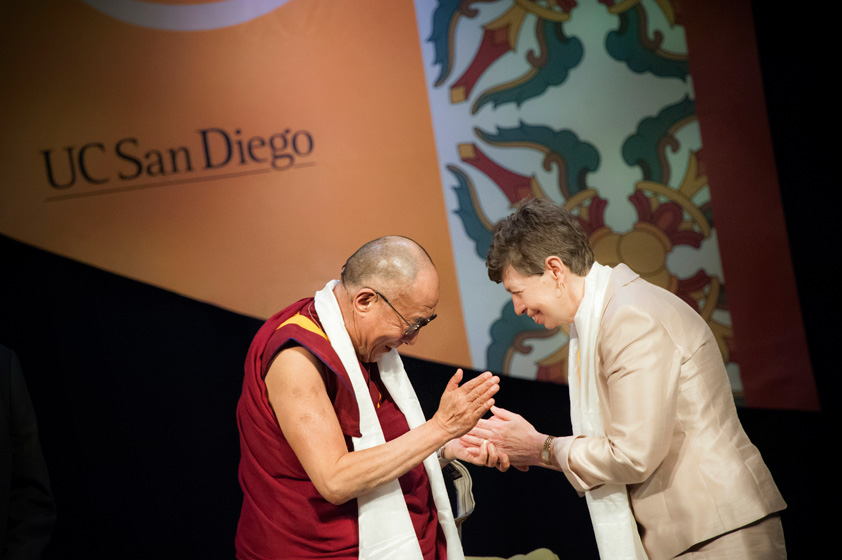
View Dalai Lama Slideshow | Photos by Erik Jepsen/UC San Diego Publications
With a UC San Diego Triton visor protecting him from the hot glare of spotlights, the 14th Dalai Lama deconstructed the barriers between science and spirituality Wednesday on his first official visit to San Diego.
UC San Diego was the first stop on a two-day tour of San Diego universities by the man who is the spiritual leader of Tibetan Buddhists and a Nobel Peace Prize winner revered by millions of people, Buddhist and non-Buddhist, worldwide. More than 4,200 people – most obtaining tickets that were sold out in the first hour of the day they went on sale in February – jammed RIMAC Arena to give him a rock star’s welcome.
Staff Member Recounts Receiving Advice from Dalai Lama
By Sarah Gordon
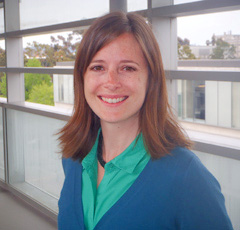
Sarah Gordon, a specialist in Environmental Health & Safety, was among the crowd of people who packed RIMAC to listen to the Dalai Lama. Here she recounts the impact the Dalai Lama had on her as he answered her submitted question from the audience.
When he took the stage, he joyfully watched the opening musicians and tapped his fingers on his knees to the rhythm. For me, this was one of the most memorable moments, watching the Dalai Lama embrace this moment of joy and awe as he watched the percussionists. When he later inspired us to laughter, we began to feel the energy he radiates: joyful, calm and humorous, full of child-like laughter mixed with the wisdom of an old man. Soon, the translator turned to a stack of large cards in his lap with questions printed on them from the audience. My question focused on how people can maintain patience and calm when engaged in a discussion with those who disbelieve in the realities of climate change. Nobody around me knew it was my question. I bit my lip in excitement. I knew that his answer would be guidance for all of humanity, but I felt like he was speaking directly to me. As he spoke, my chin trembled with the emotional impact of the moment. “We have to listen with respect … remember the advice of 8th century Buddhist master who said, with respect to a problem: ‘If there is a solution, there's no need to be overwhelmed or worried about it. And if there is no solution, then there is no point in worrying about it.’ ” I have felt passionately invigorated by his wisdom ever since.
University organizers chose climate change as the topic for the Dalai Lama’s public appearance at UC San Diego. Joining the Dalai Lama on stage were Distinguished Professor of Atmospheric and Climate Science Veerabhadran Ramanathan and Distinguished Professor Emeritus Richard Somerville, both of UC San Diego’s Scripps Institution of Oceanography. The two climate science pioneers offered their perspectives on the state of global warming research and the challenges standing in the way of action to slow dangerous trends in climate.
The Dalai Lama commended the scientists’ opening monologues and then explained that he himself had prepared no notes and had failed to do his homework.
“Reason? I’m lazy,” he said to broad laughter.
The scientists and the spiritual leader considered the human activities that have led to climate change and the ethical imperative to modify those activities for the health of the planet. Ramanathan, who is also a member of the Pontifical Academy of Sciences, said the academy’s preparation of a report last year revealed to him the power that spiritual and religious leaders have in effecting change. He opened the dialogue with a request for the Dalai Lama’s opinion on how spiritual leaders can best exert their moral authority to spur climate change solutions among their followers. In response, the Dalai Lama cited the need for spiritual leaders to promote education as a vehicle for awareness and compassion.
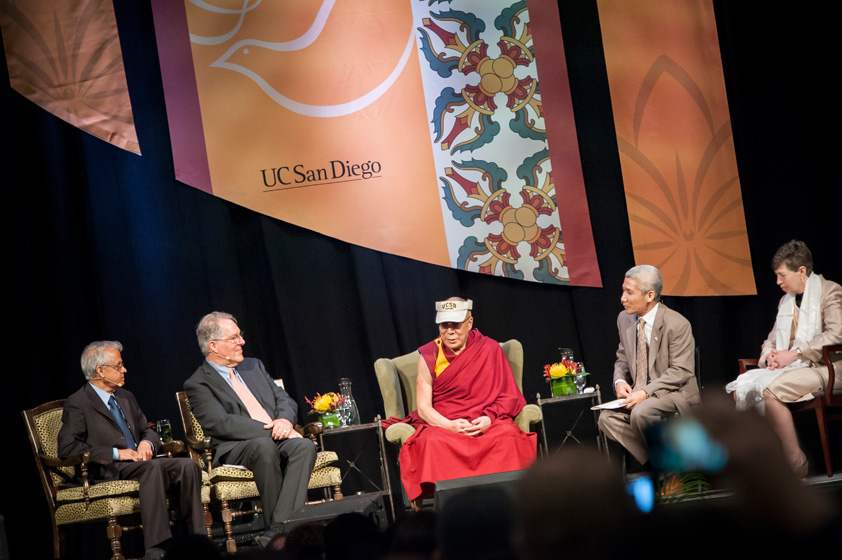
“This small blue planet is our only home…for now,” said the Dalai Lama, noting the quest of scientists to find life-supporting planets elsewhere in the universe. “We must take care.”
The three speakers found several points of agreement. The inaction of countries to control emissions of carbon dioxide and other global warming agents, for example, is often done in the name of protecting national economic interest. The scientists and the Buddhist leader, however, regarded the conflict between such concerns and concerns for global welfare to be a false one. A country protects its own interests when it acts for the general good, they agreed.
Ramanathan has recently reported his finding that the pace of global warming can be significantly slowed in coming decades even if the chief global warming gas, carbon dioxide, is not controlled. Emissions of other greenhouse agents such as black carbon soot, halocarbons and methane can be reduced if technologies used in the developed world can be spread to poorer countries, he said, adding that such efforts would have the added benefit of saving millions of lives of people forced to damage their lungs using wood-burning cookstoves. The concept gained traction this February when Secretary of State Hillary Clinton announced the formation of an international coalition to control so-called “short-lived climate forcers.”
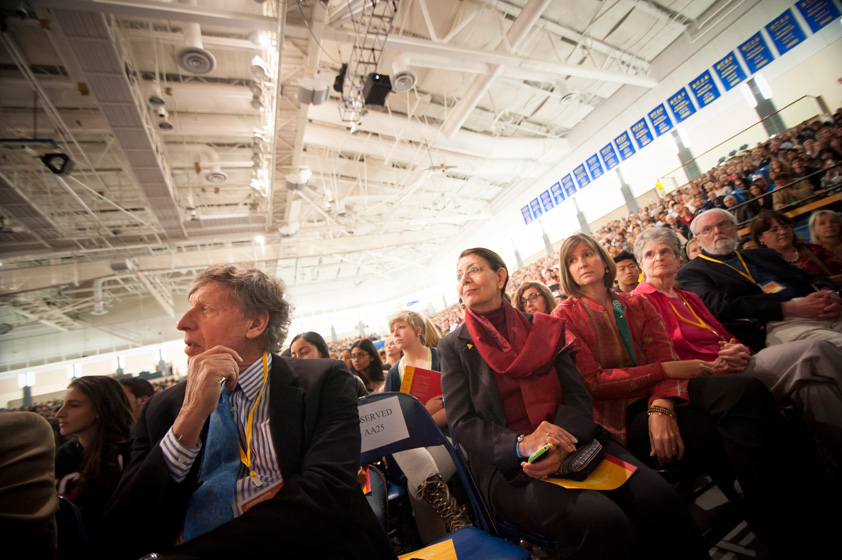
Ramanathan also added that the differing levels of contributions to global warming coming from wealthier nations versus the developing world need to be acknowledged as equitable solutions are engineered.
“We have left 2.7 billion people (in the developing world) behind,” Ramanathan told the audience. “Many people don’t even know what fossil fuels are.”
UC San Diego Chancellor Marye Anne Fox escorted the Dalai Lama onstage for the public dialogue and at other campus events, including a brief press conference before the event. Afterwards, the Dalai Lama extended an impromptu invitation to Ramanathan and Somerville to a lunch of Tibetan stews and dumplings prepared by members of San Diego’s Tibetan community, which was doing the cooking for the Dalai Lama during his time in the city.
Born Tenzin Gyatso in 1935 in northeastern Tibet, he was recognized as the reincarnation of the 13th Dalai Lama when he was 2 years old. After the Chinese government suppressed a Tibetan national uprising in 1959, the Dalai Lama began living in exile in Dharmsala, India. During his extensive travels since, he has visited more than 60 countries, engaging in dialogues with national and spiritual leaders.
Somerville expressed delight after the panel discussion at the spiritual leader’s personable nature and humor.
“This was a thrilling experience and a real privilege,” Somerville said. “He’s a trusted messenger and his opinions matter to millions of people.”
The Dalai Lama visited three major San Diego universities but was quick to admit to the audience gathered at RIMAC that he was no expert on higher education, having had no experience of it himself. After his UC San Diego appearance, he moved on to the University of San Diego, where he provided his insights on the topic of cultivating peace and justice. On Thursday morning, he addressed a San Diego State University audience in a talk entitled “Upholding Universal Ethics and Compassion in Challenging Times.” In all, an estimated 20,000 people attended the three events.
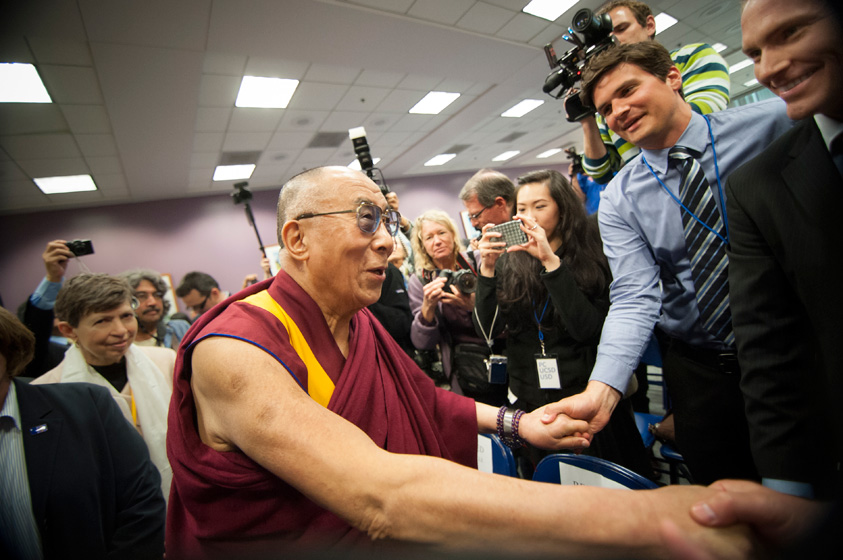
A fourth private luncheon took place Thursday back at UC San Diego at the Robert Paine Scripps Forum for Science, Society and the Environment at Scripps. There the topic was another UC San Diego science specialty – neuroscience. Speakers V.S. Ramachandran from UC San Diego, Lawrence Hinman from USD and Jennifer Thomas of San Diego State joined the Dalai Lama for a discussion about the science of human consciousness and the origins of compassion.
During the public address at UC San Diego, the Dalai Lama, Somerville and Ramanathan expressed a shared optimism that the world could stop the problem of climate change. Somerville noted that France weaned itself off of fossil fuel as a primary energy source within one generation. Ramanathan quipped that when he began his career in the 1970s, the only person who would attend his lectures was his wife. Now, he said, he was in front of an audience of thousands pondering the problem with one of the world’s foremost spiritual leaders.
“Change happens when people want it,” said Somerville, who suggested to an audience questioner that politicians react to the demands of their constituents and wouldn’t be able to ignore climate change if they perceived it as important to the voting public.
The Dalai Lama pointed out that in Buddhist tradition, new scientific evidence must be allowed to overrule religious beliefs if the beliefs are shown to be false. Scientists such as Ramanathan and Somerville are rightly considered teachers and gurus who lead others to understand reality, he said.
To those wishing to effect change in the world, the Dalai Lama said, “Your efforts must be realistic. We must not rely on appearances. We must do research to determine what is real. With no research, you can’t find reality.”
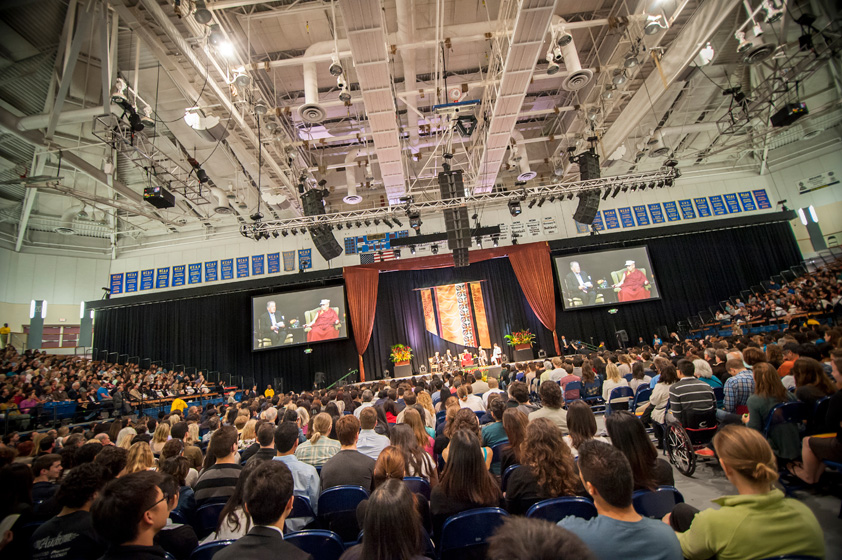
Share This:
Stay in the Know
Keep up with all the latest from UC San Diego. Subscribe to the newsletter today.



